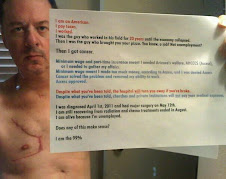
Thankfully, Randi's staff decided to take on that challenge recently, so her Assistant Producer, Shawn "Smith" Peirce joined guest host Nicole Sandler for a seven step walk-through on how Randi's listeners, Nicole's listeners, or really anyone can compile information in the way that Randi's staff has done it for over a decade.
Listen to the full explanation by Shawn with Nicole, cross-posted from RadioOrNot.com (where this post will continue existing after RandiRhodes.com is shut down), and follow along with the steps below.
http://directory.libsyn.com/episode/index/id/2822848#.U2q7bcBNQJs.
Step 1: Gather Your Raw Materials
Doing what Randi and her staff have always done isn't nearly as complicated as some people might think. But it does take dedication, and a commitment to excellence…along with a few simple tools.
 Tool #1: Time. You'll need to commit to setting aside at least
one hour, on each day you want to be informed. Think of all the crap TV
you or someone you know already watches, or all the time you waste each
day on silly games like Candy Crush. If being a well-informed,
well-educated American citizen is something you claim is important to you, carving out an hour from your day shouldn't be much for you to prove those claims.
Tool #1: Time. You'll need to commit to setting aside at least
one hour, on each day you want to be informed. Think of all the crap TV
you or someone you know already watches, or all the time you waste each
day on silly games like Candy Crush. If being a well-informed,
well-educated American citizen is something you claim is important to you, carving out an hour from your day shouldn't be much for you to prove those claims.There's are also a few keys to managing your time. If you hold yourself to a time limit, and you skim the stories first, before you take the time to deeply read them, you'll likely find it significantly easier to keep yourself on track. Also, Randi and her team find a place you can read, away from distractions.
Tool #2:
 A
computer with internet access. We realize there are some listeners to
radio programs these days who have limited internet access. Some
individuals may even have to go to the library every few days to
download the podcasts of their favorite online radio programs. But there are estimated to be more than 120,000 libraries in the U.S. today -
the overwhelming majority of which have free internet access, available
to any patron who wishes to use it. Sometimes, users may have to pay a
small fee - a concept we'll hit on more than once in the course of this
lesson.
A
computer with internet access. We realize there are some listeners to
radio programs these days who have limited internet access. Some
individuals may even have to go to the library every few days to
download the podcasts of their favorite online radio programs. But there are estimated to be more than 120,000 libraries in the U.S. today -
the overwhelming majority of which have free internet access, available
to any patron who wishes to use it. Sometimes, users may have to pay a
small fee - a concept we'll hit on more than once in the course of this
lesson.It's also recommended that you use online apps like Readability, Pocket, or Evernote, or you may just want to save your links in your browser, using a service like Apple's iCloud or Google Bookmarks. That way, you can keep your links organized across your computer and mobile devices like your cell phone or tablet.
Step 2: Start With The News
Randi Rhodes has always said that she'd prefer everyone read a newspaper everyday. Admittedly, some newspapers are better than others - and some news sources online are also better than others. Still, if you're going to try to sift through the news of the day, you should probably start with an actual news source or two. For the record, Fox 'News' on TV doesn't count as a legitimate news source.
Below is a list of legitimate news sources that Randi and her staff have found generally reliable through the years. Yes, many of these websites do require subscriptions if people want to read more than a handful of articles. If the content is worth using, and worth reading? It's worth paying a little for it too.
| The New York Times | McClatchyDC | The Washington Post |
| The Wall Street Journal | Reuters | L.A. Times |
| Al Jazeera America | BBC News | Bloomberg News |
 Step 3: The Aggregators
Step 3: The AggregatorsThese are the sites that already sift through some of the news for you, and gather it together - or aggregate it - for you. Some of the aggregators like Huffpost Hill or Politico's Playbook will even send you daily e-mails of their aggregation. These sites also include some newer organizations, staffed by proven journalists like Ezra Klein or Nate Silver, that are focal points for what's being called "data journalism" - the concept of using stacks of facts to lead you to a conclusion. In the old days, that kind of thing used to just be called "journalism." By the way - that's why we don't include 'The Drudge Report' in this list: Because propaganda isn't journalism.
| The Plum Line Blog | Wonkblog at The Washington Post; |
| HuffPost Hill | Politico Playbook |
By this point, you should likely have begun to get an idea of what the major stories of the day are. Remember - you've been saving the links you've been finding, so far. You'll organize them soon.
For now, you want to check the best writers, journalists, and informed commentary websites to see what they're saying, and if they notice something you might have missed. The below list is by no means a comprehensive list - but it is a good start.
| Trusted Writers & Journalists | ||
| Robert Reich | Joan Walsh | Michael Tomasky |
| Greg Sargent | Ezra Klein | Sarah Kliff |
| Brian Beutler | David Cay Johnston | Amanda Terkel |
| Julia Ioffe | John Nichols | Joshua Holland |
| Irin Carmon | Ta-Nehsi Coates | Paul Krugman |
| Paul Waldman | Josh Rogin | Rachel Maddow |
| Eleanor Clift | Nate Silver | Ed Kilgore |
| Jonathan Bernstein | Steve Benen | Michelle Cottle |
Of course, the media organizations that host these great journalists and writers are also usually among the best in the business - and Randi's staff tends to trust them as well. Like the above list, this one is in no way comprehensive - but it is another good start.
Step 5: SORT!
So now you have a pile of links, likely in several folders, in a somewhat disorganized way. Use whatever organizing tools you've chosen to allow you to see the headlines of the stories you've chosen so far, like in the image below.

Read through the list and start putting items together that make sense. Think of it like the old Sesame Street game of "Which of these things is not like the other?" Inevitably, you'll end up with several piles of stories that all have to deal with the same subject - and inevitably, you may have a few interesting links that don't seem connected to anything else.
 Step 6: READING TIME!
Step 6: READING TIME!Now comes the most important part. Pick one or two of the piles, and read through the stories on that subject. Start with the news, and move through the commentaries. By the time you get done, you'll be more informed on the topic than most Americans - and well-armed for the next idiot dittohead just spouting the latest talking points from some idiot they heard on the radio or cable TV.
You're not done yet though…
Step 7: Follow Through.
 This is the hardest part for many people - talking about what you know, and ACTING on it, when you can.
This is the hardest part for many people - talking about what you know, and ACTING on it, when you can.Many people say, "I don't know anything about [the subject of the day]" as an excuse. The fact is, if you've taken even just a single hour to dig into the biggest topics of the day, you likely know enough to teach them what you know - simply, easily, directly. You're well-informed now, after following the above steps. That doesn't mean you're 100% right all the time - but it does mean you're likely more informed than the fool who just repeats the latest talking points they've heard on cable TV, the radio, or the internet. They likely don't understanding all of the facts, the important details, or how things are connected - things you now have a working familiarity with.
Talk about the subjects that interest you with your friends and your family. But also feel free to talk about them anywhere else. If you're standing in line at the grocery store, and some idiot is repeating the latest lies they heard on Fox, feel free to tell the truth! Yes - teen pregnancy rates are at historic lows in the U.S., and they've fallen by 51% for black teenagers in the last two decades. Yes, the unemployment rate in the U.S., as of April 2014, is the lowest it's been in 5½ years - and its finally almost back to where it was before the Great Bush Recession nearly destroyed the world's economies.
Part of the reason stupid has proliferated in our society is because of right-wing hate radio and outlets like Fox, that push lies 24/7/365. That kind of propaganda emboldens those who are ignorant and ill-informed or misinformed, and makes them feel like they can bully around anyone who disagrees with them.
If you are well-informed, and well-educated, you are also well-armed for an intellectual battle. Remember - they're likely intellectually unarmed and unprepared for a true battle of wits. They've got a lot of bluster, and the latest talking points from whatever paid propagandist they've been conned into thinking is a genius. But that's all they have.
 You
have the facts - and you have them from multiple different sources. You
also have millions of Americans who agree with you - who are just
waiting for someone to stand up.
You
have the facts - and you have them from multiple different sources. You
also have millions of Americans who agree with you - who are just
waiting for someone to stand up.So stand up for yourself, and stand up for the truth. Once the extremists realize they can't bully you, many of them will simply sit down, or go away. Some of them them though, may want to learn how you became so well informed.
So don't run away from them. Be better than they are.
Teach them. Each one, teach one. Just like Randi and those like her have been doing for years.
Then? GO OUT AND VOTE. Every election. Every time. Always. Vote. Vote. Vote. Vote when you're tired. Vote when you have to wait hours. Vote when you have to call in sick. If you are alive? Vote.
And while you're at it? Get involved in a local political organization. Go to your local city council meetings, and school board meetings. Get involved. Stay involved. Every day.
If you do that? The best days of America will still be ahead of us.
Or you can stay home. And whatever political hellscape or bogus impeachment, or ginned up war they want to send your kids or grandkids to get killed in - again? That'll be your fault for not showing up at the ballot box.
It's YOUR call. Because ultimately, YOU HAVE THE POWER.
If your vote wasn't so powerful, and so important?
Why would they try so hard to steal it from you?


























No comments:
Post a Comment